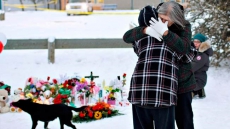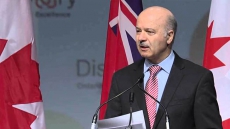TORONTO — A guilty finding against a Toronto police officer who gunned down a knife-wielding teen on an empty streetcar suggests the public has become more sensitive toward how police deal with those in crisis, some experts said Tuesday.
At the same time, they said, the prosecution of Const. James Forcillo has highlighted the need to address systemic issues around police training and the funding of mental health services.
"The public no longer has an appetite for police simply saying, 'This is use of force'," said Frances Jewell, executive director with the Mental Health Rights Coalition in Hamilton.
"The conversation has started but there's a disconnect between what police are saying has changed and what has changed."
In what has been described as a "compromise" verdict, a jury acquitted Forcillo on Monday of second-degree murder for shooting Sammy Yatim, 18, but found him guilty of attempted murder for continuing to fire after the dying teen had fallen to the floor.
Forcillo's union warned the verdict would put officers at further risk by causing them to hesitate before responding to dangerous situations. On the other hand, the lawyer for Yatim's family suggested too many officers have been literally getting away with murder by claiming self-defence.
Dorothy Cotton, a forensic psychologist in Kingston, Ont., said the verdict is a sign attitudes toward the mentally ill — and police accountability — have shifted.

"The significance of this whole trial is really in the fact that there was a trial and he was found guilty of anything at all," said Cotton, who has worked with the Canadian Association of Chiefs of Police and the Mental Health Commission of Canada.
"In contrast to attitudes we had in the past toward people who appear to be crazy or out of their minds, society as a whole is saying that this is not the norm and we can't tolerate this any more."
Statistics Canada data show about one million interactions between police and people in some kind of mental health crisis each year. The vast majority end without serious incident. For others, however, the result is what advocates consider an unnecessary fatality as well as trauma for both the families and officers involved.
Advocates have long called for better police training for dealing with people in crisis. They insist officers should do everything possible to defuse a volatile situation before resorting to Tasers or firearms.
For their part, police insist they are doing what they can to help. In B.C., for example, new and seasoned officers are required to undergo training on dealing with the mentally ill. Other services say their training does emphasize de-escalation techniques.
Jewell, however, was skeptical, noting Forcillo barked orders and shot Yatim dead less than one minute after arriving on scene.
"Where on earth did they get the message that was a de-escalation technique?" she said. "I must say I'm jaded in that we hear that the changes will happen and yet they don't."
Still, training and accountability issues aside, mental health advocates say the Yatim killing — and others like it — demonstrate a crying need for more funding of supports for the mentally ill to avert potentially deadly confrontations with officers in the first place.
All too often, they note, people finding themselves on the wrong end of an officer's gun had tried unsuccessfully to find help for their worsening mental health.
A few years ago, for example, Richard Kachkar went on a rampage with a stolen snowplow, prompting Toronto police Sgt. Ryan Russell to open fire in an effort to stop him. In that tragic case, Russell was run down and killed. Kachkar, who for weeks had sparked concerns about his deteriorating behaviour, was found not criminally responsible.
Camille Quenneville, who heads the Canadian Mental Health Association in Ontario, said such situations highlight the need for 24-hour mobile-crisis intervention teams. She also said her organization's new crisis centre in London, Ont., has succeeded in taking calls that might otherwise have gone to 911 or the police.




